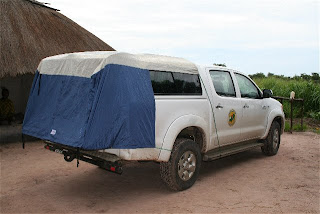Sunday morning we were awake at daybreak and discovered that the windows in our camper tent offer no privacy. I tentatively sat up in my sleeping bag and looked out on four pairs of eyes. Our host family’s children were sitting in front of their house (about six feet from our truck) and watching us intently.
We had agreed to go meet the Chief of the area at 7:00 that morning. As we headed toward his home (called a palace), we were escorted by his guard and told what to do. As soon as the Chief emerged from his house, we performed the traditional greeting by getting on our knees and clapping. The Chief and his wife then offered us seats and greeted us warmly. The Chief expressed his appreciation for the late-night hospital run. Apparently if we had not been available, the Chief would have been the one to arrange transportation, and it would have been Sunday morning at the earliest before any action could have been taken. Moses, the local church leader who accompanied us, invited the Chief to attend the church’s worship service that morning, and the Chief agreed.

The Chief and his wife
The Sunday service was held in the local school building about a mile from our host campground. The regular attendance at the congregation runs around 16 or so, but since the word was out about our visit, several local community leaders and visitors came and swelled the attendance to near 40. After the singing and David’s sermon, Moses provided detailed introductions of every visitor. Then we headed down to the river (another mile walk) for seven baptisms.

David met with the men of the congregation that afternoon, finally arriving back at our vehicle around 3:30. The Chief had requested that we come back to visit him, so off we went again to his palace. This time, since we were already good friends, we got to skip the kneeling and clapping. The Chief informed us that he wanted to serve us dinner and that we would walk around his farm while it was being prepared.
We spent a delightful hour with the Chief as we walked through his fields of maize and soybeans and saw the artesian well that provides clean water for most of the village. I have still not figured out the intricacies of the role of chiefs in Zambia, but each area has a chief who in involved in settling disputes. Chief Mpeepo told us that he holds court every Friday and judges matters like marriage problems, land disputes, and conflicts between his subjects. The punishment he assigns usually involves some sort of manual labor in the farm fields or construction of buildings for the Chief.
Dinner—our first meal since tea and buns at breakfast--was finally served at 5:00. The Chief insisted that David sit in his chair for the meal, but the Chief himself did not eat with us. We enjoyed the traditional Zambian meal of chicken, nshima, and cabbage served by the Chief’s delightful wife.
We had taken some photos of the Chief that morning, and he requested that we take some more, which we were happy to do. The Chief invited us to come back, even offering to give us land if we would move into his chiefdom!
We finally said our goodbyes and headed back to our campsite to get on the road before dark.
To be continued

The congregation at Mpeepo










